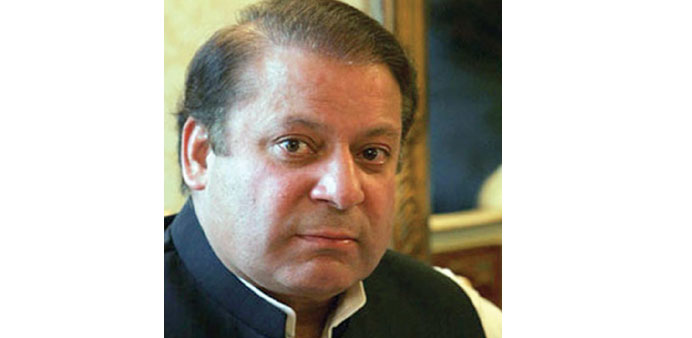AFP
Pakistan yesterday said it has crippled the command and control system of local Taliban militants adding that the likelihood of a backlash to the ongoing military offensive in the troubled northwest would be “minimal”.
Addressing a national security conference in Islamabad, Prime Minister Nawaz Sharif said the ongoing strikes against the militants were inevitable because peace talks had failed to proceed.
But he played down the likelihood of militants being able to hit back.
“If there is a reaction to the operation Zarb-e-Azb it would be very minimal,” Sharif said in an address broadcast live on television.
Pakistan began an offensive in the northwest following a brazen attack on the country’s busiest airport in Karachi which killed dozens and left a nascent peace process in tatters.
More than 500 militants and 27 soldiers have been killed in the assault so far, according to the military, though their death toll for insurgents cannot be independently confirmed.
In a statement issued to the media after conference, military officials said they were confident that the command and control system of the Pakistani Taliban (TTP) had been “crippled”.
The statement added that “all political and religious parties agreed that state has to fight and eliminate militancy”.
Sharif added that his nation needed to do more to improve relations with its neighbours.
Both Kabul and Islamabad accuse each other of not doing enough to tackle cross border militancy while Pakistan has long had frosty relationship with India.
“We need to have cordial relations with our neighbours if we want to progress, Pakistan cannot live in isolation. We don’t have relations with a single neighbour to be proud of,” he said.
He added: “We want good relations with India.”
After sweeping to a landslide election victory last month, India’s Hindu nationalist Prime Minister Narendra Modi invited Sharif to his inauguration in a surprise move seen as a significant olive branch to India’s Muslim neighbour.
Pakistan’s semi-autonomous tribal areas on the Afghan border have for years been a hideout for Islamist militants of all stripes — including Al Qaeda and the homegrown TTP as well as foreign fighters such as Uzbeks and Uighurs.
Washington pressed Islamabad for years to take action to wipe out sanctuaries in North Waziristan, which militants have used to launch attacks on Nato forces in neighbouring Afghanistan.
More than 800,000 people have been forced to flee from North Waziristan by the assault, with most ending up in the nearby town of Bannu.
There have been fears that many top militants also fled, including fighters from the feared Haqqani network which is blamed for numerous bloody attacks in Afghanistan.

